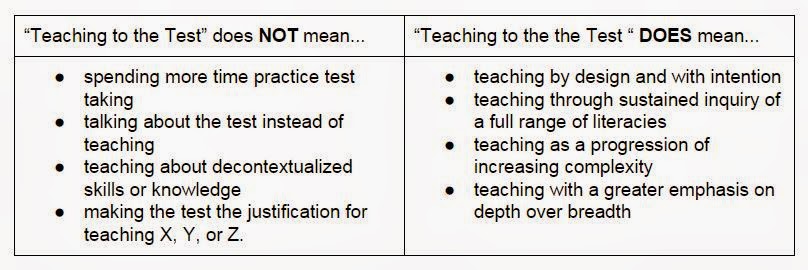Andrea Reichenberger contributed today's post. More of Andrea's thinking can be found here.
Standardized testing is a topic that weighs heavily on all of our minds as coaches, teachers, administrators, parents, and students this time of year. Ultimately, the testing is required whether we agree with it or not, but it does trigger interesting discussions about the idea of “teaching to the test.” When I hear this phrase, I often react negatively and have to refrain from screaming, “ABSOLUTELY NOT!” But the more rational side of me forces me to ask, what does “teaching to the test” mean, or rather, what should it mean in 2015? How can we change the narrative? I recently “attended” Jim Burke’s online webinar sponsored by Corwin Press entitled: When Is It Best to Teach to the Test? One of the ideas I loved about this webinar (and I loved several) was Mr. Burke’s creation of a new definition for “teaching to the test.”
(Forgive me Mr. Burke, as I have stolen the important points straight from your slides.)
Burke reiterates that we need to prepare our students for assessments such as the Badger Exam, ASPIRE/ACT, AP Exams, etc without interrupting our daily instruction. We do this by focusing on the skills our students need as a result of the shifts in the standards that these assessment align to including: close reading, using text based evidence to support their thinking, writing from sources, using academic language, increasing text complexity, focusing on the importance of argument and a greater emphasis on nonfiction and literacy in other disciplines. Since this is the case, and since we are shifting our definition, Burke reminds us that we should ALL be collectively “teaching to the test” and therefore need to be intentional when choosing and/or creating:
- Texts
- Topics
- Tasks
- Tests
- Technology
- Techniques
Mr. Burke summarizes it best when he states, “Students learn best when assessment and preparations for tests are integrated into our daily instruction as a means of enriching and extending that instruction.” I agree. Thank you for changing the narrative for all of us. Spread the good word, my friends!
Please see page 4 of the link from Burke’s English Companion handouts for using Webb’s Depth of Knowledge Model. If you have an hour to spare, you can access the archived webinar here.



No comments:
Post a Comment
Comments are moderated. Your comment will appear after approval by this blog's editor.